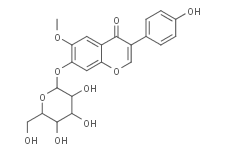
Glycitin
CAS No. 40246-10-4
Glycitin( Glycitein-7-beta-O-glucoside | Glycitin | ZX-AFC000687 )
Catalog No. M18523 CAS No. 40246-10-4
Glycitin, a natural isoflavone isolated from legumes, can promote the proliferation of bone marrow stromal cells and osteoblasts and suppresses bone turnover.
Purity : >98% (HPLC)
 COA
COA
 Datasheet
Datasheet
 HNMR
HNMR
 HPLC
HPLC
 MSDS
MSDS
 Handing Instructions
Handing Instructions
| Size | Price / USD | Stock | Quantity |
| 5MG | 49 | In Stock |


|
| 10MG | 67 | In Stock |


|
| 25MG | 105 | In Stock |


|
| 50MG | 137 | In Stock |


|
| 100MG | Get Quote | In Stock |


|
| 200MG | Get Quote | In Stock |


|
| 500MG | Get Quote | In Stock |


|
| 1G | Get Quote | In Stock |


|
Biological Information
-
Product NameGlycitin
-
NoteResearch use only, not for human use.
-
Brief DescriptionGlycitin, a natural isoflavone isolated from legumes, can promote the proliferation of bone marrow stromal cells and osteoblasts and suppresses bone turnover.
-
DescriptionGlycitin is a TAS2R agonist found in soy. It suppresses invasive activity of glioma cells, increases proliferation of mouse bone marrow stromal cells and osteoblasts, and inhibits adipocytic transdifferentiation of osteoblasts.
-
In VitroCell Viability Assay Cell Line:Bone marrow stem cells (BMSCs) Concentration:0.01, 0.5, 1, 5 and 10 μM Incubation Time:7 days Result:Increased cell proliferation and promoted osteoblast formation from BMSCs.
-
In VivoAnimal Model:BALB/c male mice (6-8 weeks old, 18-22 g weight) treated with LPS Dosage:5 mg/kg, 10 mg/kg and 20 mg/kg Administration:Intraperitoneal injection; three times (once every 8 h)Result:Obviously alleviated the lung injury induced by LPS.
-
SynonymsGlycitein-7-beta-O-glucoside | Glycitin | ZX-AFC000687
-
PathwayOthers
-
TargetOther Targets
-
RecptorOthers
-
Research AreaOthers-Field
-
Indication——
Chemical Information
-
CAS Number40246-10-4
-
Formula Weight446.41
-
Molecular FormulaC22H22O10
-
Purity>98% (HPLC)
-
SolubilityDMSO : ≥ 38 mg/mL; 85.13 mM
-
SMILESCOc1c(cc2c(c1)c(=O)c(co2)c1ccc(cc1)O)O[C@H]1[C@@H]([C@H]([C@@H]([C@H](O1)CO)O)O)O
-
Chemical Name3-(4-hydroxyphenyl)-6-methoxy-7-(((2S,3R,4S,5S,6R)-3,4,5-trihydroxy-6-(hydroxymethyl)tetrahydro-2H-pyran-2-yl)oxy)-4H-chromen-4-one
Shipping & Storage Information
-
Storage(-20℃)
-
ShippingWith Ice Pack
-
Stability≥ 2 years
Reference
1. Zang Y, Igarashi K, Yu C. Biosci Biotechnol Biochem. 2015;79(1):117-23.
molnova catalog



related products
-
Cucurbitacin S
Cucurbitacin S is isolated from cucurbitaceae with anticancer and anti-inflammatory activities.
-
Periplogenin 3-[O-be...
Periplogenin 3-[O-beta-glucopyranosyl-(1->4)-beta-sarmentopyranoside] is a natural product from Periploca sepiumBge.
-
Propargyl-PEG17-meth...
Propargyl-PEG17-methane is a PEG-based PROTAC linker that can be used in the synthesis of PROTACs.



 Cart
Cart
 sales@molnova.com
sales@molnova.com


